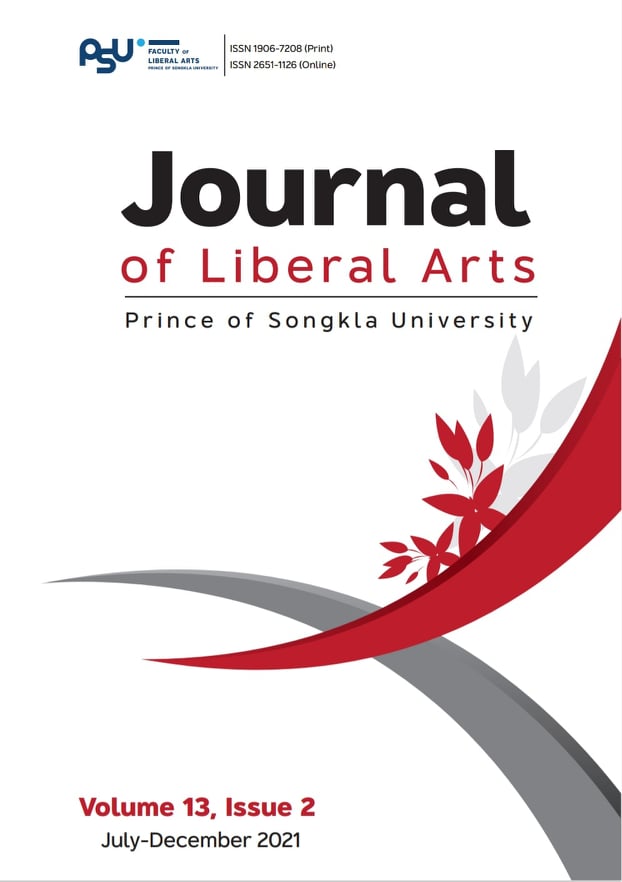Effectiveness of Using Grammar Logs With Explicit Corrective Feedback in Improving Grammatical Ability for Writing Skill of Grade 9 Students
DOI:
https://doi.org/10.14456/jlapsu.2021.7Keywords:
effectiveness of using the grammar log, writing, grammatical ability, grammar log, explicit written corrective feedbackAbstract
The objectives of this research were to study the effectiveness of the use of grammar logs with explicit corrective feedback of Grade 9 (G.9) students in improving the grammatical ability for writing and to survey students’ opinions toward the use of grammar logs. The population was Grade 9 students studying
at Khlong Thom Ratrangsan Secondary School, Krabi and 30 students were randomly selected as participants in this study. The instruments employed in this study were writing tasks, grammar logs, a questionnaire
and teaching materials. The findings showed that the use of grammar logs with explicit corrective written feedback had significant differences in improving students’ overall grammatical ability for writing and the students had strong positive opinions towards the use of grammar logs. The findings suggest that the grammar log with the explicit corrective feedback is beneficial in writing; however, low proficiency students may need more time to record grammar logs and finish the writing tasks.
References
Al-Sobhi, B. M. S., Rashid, S. M., Abdullah, A. N., & Darmi, R. (2017). Arab ESL secondary school students’ spelling errors. International Journal of Education and Literacy Studies, 5(3), 16-23.
Bitchener, J., & Knoch, U. (2009). The relative effectiveness of different types of direct written corrective feedback. System, 37, 322-329.
Bitchener, J., & Knoch, U. (2010). The contribution of written corrective feedback to language development:
A ten-month investigation. Applied Linguistics, 31, 193- 214.
Nonkukhetkhong, K. (2013). Grammar error analysis of the first year English major students, Udon Thani Rajabhat University [Official conference proceedings]. The Asian Conference on Language Learning 2013, Japan. http://papers.iafor.org/wp-content/uploads/papers/acll2013/ACLL2013_0068.pdf
Ellis, R. (2008). The study of second language acquisition (2nd ed.). Oxford University Press.
Hirsche, R. (2011). A qualitative study in grammar logs. International Journal of Pedagogies and Learning, 6(2), 126-139. https://www.researchgate.net/profile/Rob_Hirschel/publication/271152961_A_qualitative_study_in_grammar_logs/links/
Kamimura, T. (2006). Effects of peer feedback on EFL student writers at different levels of English proficiency: A Japanese context. TESL Canada Journal, 23, 12-39.
Kaweera, C. & Usaha, S. (2008). The impact of different types of teacher written feedback on EFL university students’ writing. KKU Research Journal, 8(2), 83-94.
Liu, Y. (2008). The effects of error feedback in second language writing. Arizona Working Papers in SLA & Teaching, 15(1), 65-79. http://www.w3.coh.arizona/edu/awp/
Lush, B. (2002). Writing errors: A case study of Thai students’ writing errors. Thai TESOL BULLEIN, 15(1). 75-82.
Lyster, R., & Ranta, L. (1997). Corrective feedback and learner uptake. Studies in Second Language Acquisition, 19(1), 37-66.
Pica, T. (1984). Methods of morpheme quantification: Their effect on interpretation of second language data. Studies in Second Language Acquisition, 6, 69-78.
Richard, C.J., & Renandya, A.W. (2002). Methodology in language teaching. Cambridge University Press.
Strijbos, J.W., & Sluijsmans, D. (2010). Unravelling peer assessment: Methodological, functional and conceptual developments. Learning and Instruction, 20, 265-269.
Weinburgh, M. H. (2000). Gender, ethnicity, and grade level as predictors of middle school students’ attitudes toward science. ERIC. https://files.eric.ed.gov/fulltext/ED442662.pdf
Wiriyachitra, A. (2001). A Thai university English scenario in the coming decade. ThaiTESOL, 14 (1), 4-7.
Downloads
Published
How to Cite
Issue
Section
License
Copyright (c) 2021 Phatcharaphan Sakanlai, Panida Sukseemuang

This work is licensed under a Creative Commons Attribution-NonCommercial-NoDerivatives 4.0 International License.
The authors retain the copyright to their article but the Journal of Liberal Arts, Prince of Songkla University reserves the exclusive rights to first publication.






